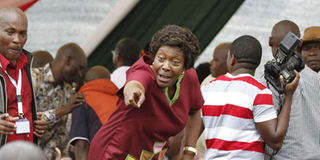Insulting President newsworthy, but are those insults a phantom?

Kitui Governor Charity Ngilu shouting to Gatundu South MP Moses Kuria during the BBI rally in Kitui stadium, Kitui County on February 1, 2020. PHOTO | POOL | NATION MEDIA GROUP
What you need to know:
- Many politicians in these times of the BBI have taken to accusing others of insulting President Kenyatta.
- Kirinyaga Governor Anne Waiguru accuses Deputy President William Ruto and his supporters of insulting and disrespecting the President.
- In September 2017, when Embakasi East MP Babu Owino allegedly referred to President Kenyatta as “mtoto wa mbwa”.
In the wake of the hullabaloo over “insulting the President”, Mungai Githuku writes to say readers are “mature people” and journalists who write such stories should tell them what the insults are. Otherwise, he fears, some readers will believe the President was actually insulted.
He cites the example of a relative who expressed his shock, saying, Bahati MP Kimani Ngunjiri had actually insulted President Kenyatta. “Everything is here,” said the relative, pointing at his phone on the table at a social meeting. He was referring to what President Kenyatta said when he visited Bahati on January 28.
INSULTING THE PRESIDENT
The President told the people of Bahati: “I don’t know what I did to him, but every time I see him on TVs and newspapers, he is insulting me… He is always shouting that things are very bad on the ground and I wanted to know if I have wronged you people.”
Many politicians in these times of the Building Bridges Initiative have taken to accusing others of insulting President Kenyatta. Foremost among them is Kirinyaga Governor Anne Waiguru, who accuses Deputy President William Ruto and his supporters of insulting and disrespecting the President.
The problem, as Mr Mungai points out, is that readers are never told what the insults are, whether they are real or a figment of the imagination. You see, a news story is incomplete when there are information gaps and the reader has to fill them.
It may not be proper to repeat the insults, especially when they are vulgar or repugnant, but the reader should be left in no doubt as to their nature or gravity.
It was quite clear what was meant by “insulting the President” in the days before the BBI. Like in September 2017, when Embakasi East MP Babu Owino allegedly referred to President Kenyatta as “mtoto wa mbwa”.
In these BBI times, insult news are published without saying what the insults are. That begs the question: Are they really insults or just a phantom?
EVIDENCE-BASED
Accusing rival politicians of insulting the President should not be an open season, as happened during the Kitui BBI rally. Gatundu South MP Moses Kuria was manhandled after Kitui Governor Charity Ngilu ordered his removal from the meeting for allegedly insulting President Kenyatta.
“Nobody can insult President Uhuru and be allowed at my meeting. Get him out!” Ngilu demanded as James Nyoro, the new Kiambu Governor, joined the fray. “Remove him, remove him and take him to Gatundu! What has he come to do in Ukambani? Carry him out of the dais immediately,” Mr Nyoro said.
Journalists should seek to make insult news more evidence-based. In reporting such news, journalists should also remember that in law, insults are mostly expressions of opinion and freedom of expression.
We owe that freedom to Robert Alai, the blogger who on December 17, 2014, was charged with insulting President Kenyatta. He had tweeted the words: “Insulting Raila is what Uhuru can do. He hasn’t realised the value of the Presidency. Adolescent President. This seat needs Maturity.”
GUILTY
The prosecution said the words were “calculated to bring into contempt the lawful authority of the President.” The charge was based on Section 132 of the Penal Code, which states that any person who publishes words calculated to bring into contempt the lawful authority of a public officer, is guilty of an offence.
Mr Alai petitioned the High Court to declare Section 132 “unconstitutional and invalid.” His counsel, Elisha Ongoya, told the court, among other things, that a provision that would force people to speak in low tones in a democratic society, like section 132 did, is unconstitutional.
In an April 2017 judgment, Justice Chacha Mwita agreed. Article 33 of the Constitution, he said, guarantees freedom of expression. Only through public criticism, he said, do citizens make their leaders know that certain actions may not be in the interest of the nation. In a democracy, “it is not necessary that everyone should sing the same song,” he added.
Send your complaints to [email protected]. Call or text 0721 989 264





